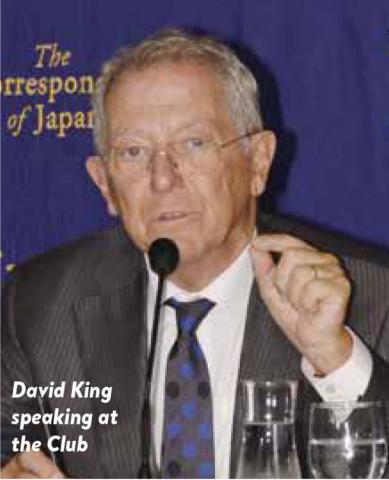Issue:
There are some bright spots in a bleak report on the effects of climate change.
Turning down the heat
by JULIAN RYALL

GLOBAL TEMPERATURES ARE WRITING new highs, the polar ice caps are melting, sea levels are rising and deforestation continues, albeit at a reduced rate. The outlook for our planet and mankind would appear pretty bleak. Yet in the face of even more alarming predictions, such as a surge in global sea levels of as much as eight meters, Sir David King, the UK Foreign Secretary’s Special Representative for Climate Change, remains remarkably upbeat.
The nations of the world are faced with a crisis, he said at a press conference at the FCCJ on Oct. 5, but they have recognized it as such and have made plans and commitments to halting emissions that are harmful to the planet. If those promises are kept, he said, then we should avoid a global climate catastrophe.
But there is not, he emphasized, a lot of room for error nor a moment to lose. “The last 14 months have each been the hottest month for that time of the year for the whole planet, while the hottest years on record have all been in the last 20 years,” King said. “What this demonstrates, of course, is that the trend is upwards and will go on inexorably upwards unless global actions are taken.”
The Paris Agreement, signed by 195 countries at the 21st Conference of the Parties of the United Nations Framework Convention on Climate Change in December 2015, is designed to ensure that measures are taken on a global scale, with a commitment to limit global temperature rise to 2 degrees centigrade above the preindustrial age. An increase of 1.5 degrees would obviously be preferable, King added.
In addition, the nations gathered in Paris provided nationally determined voluntary contributions to reversing climate change. Unfortunately, when all the promises were added up and extrapolated out to 2030 and incorporating the loss of forested land, our world is on a pathway of a temperature increase of as much as 4 degrees.
“Four degrees is potentially calamitous,” King said. “If we have a temperature exceeding 41 or 42 with high humidity over three days, even people who are in the shade will die. They cannot get rid of their body heat fast enough. People will survive in air conditioning, but of course the risk is that air conditioning will fail under those conditions as well.
“So in parts of the world where there is not much air conditioning available, fatality rates would be extremely high once temperatures gets to that level,” he said. “And the challenge of climate change is not just temperature rise but it’s also sea level rise, changes in rainfall patterns, monsoon patterns and so on.”
King pointed to flooding as another great challenge. “Britain, like Japan, is an island nation and as sea levels rise, storms at sea mean the water incursion is further and further inland and more and more people are at risk from flooding,” he said. “When, for example, we looked at China, we learned that even under a medium level future emissions scenario, we were looking at half a billion people in South East China being at risk from flooding in a given year.”
Then there is the problem that was identified by King as “the biggest challenge” that of ocean warming, which happens more slowly than atmospheric warming and consequently will continue for many years after emissions have been brought under control.
If action is not taken urgently, then an increase in sea levels by one meter by the end of the century is likely, meaning that cities such as Calcutta, Shanghai, New York, London and Tokyo are at risk of inundation. The worst case scenario is if it becomes impossible to reverse the melting of the Greenland ice sheet and sea levels rise fully eight meters.
The Paris Agreement included a reviewability clause, King pointed out. It is now clear that the measures that have been promised by the signatory nations still fall short of what is required, and that governments need to deliver more.
King believes that is possible. “Not only is it doable,” he said. “But we have to do it because the alternatives are so dire for mankind.”
The UK, for example, passed the Climate Change Act in 2008, under which the government vowed to reduce emissions by 80 percent by 2050. It also created an international climate fund to the tune of $13.5 billion larger than the UN’s commitment of $10.3 billion to fight the problem, primarily by helping developing countries transition to a low carbon future and by developing their resistance against the effects of climate change.
UK emissions which only account for 2 percent of the global total are already down by 30 percent from 1990 figures and Britain is on course to cut emissions by 57 percent by 2030. And King was keen to emphasize that Britain’s vote to leave the European Union will have no impact on those commitments.
King also suggested that the climate crisis could also be seen as an opportunity. “The falling costs of energy installation are dramatic, but we also need new technologies, in the areas of energy storage, smart grids and so on,” he said.
Japan and the UK are among 22 countries that have signed up to the Mission Innovation scheme unveiled in Paris, providing $30 billion each year to companies to carry out research and development of the clean energy sector. “The mission is to allow every country to have 100 percent clean energy, on the grid or off grid, for all purposes by between 2025 and 2030,” he said. “This investment will allow these technologies to emerge from what is a collaborative program.”
Julian Ryall is Japan correspondent for the Daily Telegraph.

